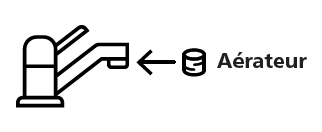Water use advisory
Is your neighbourhood under a water use advisory due to contaminated tap water? Please follow these instructions until water service is restored.
Instructions for residents
In the event that a water use advisory is issued, residents should not use or drink the tap water under any circumstances, even if it has been boiled. The tap water may contain chemicals that are hazardous to human health, even if it is clear, odourless and tasteless. Tests will be carried out to determine the nature of the contamination.
Bottled water or tap water
Residents are required to use bottled water or drinking water provided by the city for all their needs.
- For drinking, preparing beverages, baby formula, foods or ice cubes (dispose of those already made)
- For washing fruits and vegetables
- Ffor cleaning surfaces, dishes or clothes
- For brushing your teeth, washing your hands, showering or bathing
- For pets
- For flushing the toilet, unless the city issues a notice to the contrary
Distribution of drinking water
Depending on the extent of the contamination, the city could take steps to distribute drinking water in your area (from an unaffected location by tanker truck, for example). Household water (not to be consumed) could also be supplied in the same manner. It is used for flushing and for watering plants. Please view the instructions that will be transmitted for complete details.
Instructions for industries, businesses and institutions
- Shut off all water sources.
- Notify clients that the water cannot be used and post this information in locations where water is still available, if applicable.
Resumption of regular services
Has the water use advisory been lifted? Tests will be carried out to ensure that the tap water is potable and safe for drinking again.
Residents are advised to take the following additional precautions before drinking the water:
- Follow the specific rinsing instructions issued by the city based on the nature of the contamination.
- Change the filters if you have a water treatment or filtration system (pitcher, faucet filter or under-sink filter, refrigerator water dispenser, etc.) by observing the manufacturer’s recommendations.
- Empty, wash and disinfect coffee makers and ice-making machines.
- Follow the instructions transmitted for draining hot water tanks.
- Clean the aerator (the filter that unscrews at the end of the tap), when possible. Some taps may be different and may not have an accessible aerator.
Quick search
Need help?
Contact us if you have questions.
Are you sure you want to leave this page?
This page is not available in English. You will be redirected to the English home page.
